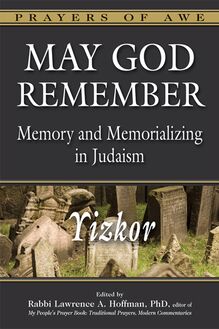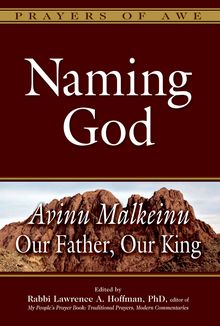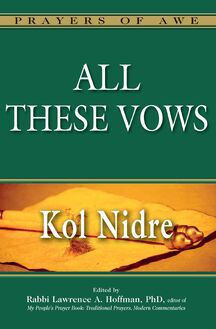May God Remember , livre ebook
209
pages
English
Ebooks
2013
Vous pourrez modifier la taille du texte de cet ouvrage
Obtenez un accès à la bibliothèque pour le consulter en ligne En savoir plus
Découvre YouScribe et accède à tout notre catalogue !
Découvre YouScribe et accède à tout notre catalogue !
209
pages
English
Ebooks
2013
Vous pourrez modifier la taille du texte de cet ouvrage
Obtenez un accès à la bibliothèque pour le consulter en ligne En savoir plus
Publié par
Date de parution
01 août 2013
Nombre de lectures
2
EAN13
9781580237703
Langue
English
An engaging and sobering look at memorializing in Judaism and why memory—ours and God's—is so central to people.
Through a series of lively introductions and commentaries, over thirty contributors—men and women, scholars, rabbis, theologians and poets, representing all Jewish denominations—examine the history and ideas behind Yizkor, the Jewish memorial service, and this fascinating chapter in Jewish piety.
Featuring the traditional prayers—provided in the original Hebrew and a new and annotated translation—this fourth volume in the Prayers of Awe series explores the profound theological questions at the core of this service and our own humanity: What happens to us after we die? Is there really an afterlife? Does our fate after death depend on the goodness with which we have pursued our earthly life? And more.
Prayers of Awe: A multi-volume series designed to explore the High Holy Day liturgy and enrich the praying experience for everyone—whether experienced worshipers or guests who encounter Jewish prayer for the very first time.
Contributors:
Yoram Bitton
Dr. Annette M. Boeckler
Dr. Marc Zvi Brettler
Rabbi Lawrence A. Englander, CM, DHL
Rabbi Edward Feinstein
Rabbi Solomon B. Freehof, PhD (z"l)
Dr. Eric L. Friedland
Rabbi Shoshana Boyd Gelfand
Rabbi Edwin Goldberg, DHL
Rabbi Andrew Goldstein, PhD
Dr. Joel M. Hoffman
Rabbi Lawrence A. Hoffman, PhD
Rabbi Walter Homolka, PhD, DHL
Rabbi Delphine Horvilleur
Rabbi Karyn D. Kedar
Rabbi Daniel Landes
Catherine Madsen
Rabbi Jonathan Magonet, PhD
Rabbi Dalia Marx, PhD
Rabbi Charles H. Middleburgh, PhD
Rabbi Jay Henry Moses
Rabbi Aaron D. Panken, PhD
Rabbi Jakob J. Petuchowski, PhD (z”l)
Rabbi Jack Riemer
Rabbi Sandy Eisenberg Sasso
Rabbi David Stern
Rabbi David A. Teutsch, PhD
Rabbi Margaret Moers Wenig, DD
Dr. Ron Wolfson
Rabbi Daniel G. Zemel
Dr. Wendy Zierler
Acknowledgments xi
Introduction: Yizkor and Memorial in Jewish Tradition 1
Rabbi Lawrence A. Hoffman, PhD
Part I: Theology and Practice
Hashkavah: Memorializing the Dead in Sephardi Practice 19
Yoram Bitton
Remembering the Dead: By Us and by God 22
Rabbi Lawrence A. Hoffman, PhD
Remembering the Dead as Halakhic Peril 30
Rabbi Daniel Landes
Memorializing the Shoah 39
Rabbi Dalia Marx, PhD
Sites and Subjects: Memory in Israeli Culture 63
Dr. Wendy Zierler
Part II: Historical Insights
Would Jeremiah Have Recited Yizkor? Yizkor and the Bible 71
Dr. Marc Zvi Brettler
Hazkarat N'shamot ("Memorial of Souls"): How It All Began 77
Rabbi Solomon B. Freehof, PhD (z"l )
Kaddish and Memorial Services 90
Rabbi Jakob J. Petuchowski, PhD (z"l )
Yizkor: A Microcosm of Liturgical Interconnectivity 104
Dr. Eric L. Friedland
"Service for the Souls”: The Origin of Modern Memorial
Services, 1819 to 1938 113
Dr. Annette M. Boeckler
Part III: The Liturgy
The Traditional Yizkor Service 129
Translation and Commentary by Dr. Joel M. Hoffman
Part IV: Interpretations and Reflections
What Happens When We Die: Intimations of Immortality 141
Rabbi Lawrence A. Englander, CM, DHL
The Age of Amusement 145
Rabbi Edward Feinstein
Remembering through Forgetting: Yizkor as Unshared
Experience 147
Rabbi Shoshana Boyd Gelfand
Hard to Plan the Day 152
Rabbi Edwin Goldberg, DHL
Why Art Thou Cast Down? 156
Rabbi Andrew Goldstein, PhD
Where Do People Go When They Die? 162
Dr. Joel M. Hoffman
Remembering Abraham Geiger 166
Rabbi Walter Homolka, PhD, DHL
An Ongoing Conversation with Empty Chairs 171
Rabbi Delphine Horvilleur
Ode to Mortality 175
Rabbi Karyn D. Kedar
What Is Yizkor For? 178
Catherine Madsen
"Empty-Handed before Adonai” 183
Rabbi Jonathan Magonet, PhD
The Hippo of Recollection Stirring in the Muddy Waters of
the Mind 188
Rabbi Charles H. Middleburgh, PhD
Re-membering: Yizkor and the Dynamics of Death 193
Rabbi Jay Henry Moses
Prayer for the Dead; Promise by the Living 198
Rabbi Aaron D. Panken, PhD
When the Golden Shields Are Gone 202
Rabbi Jack Riemer
A Soul-ar Eclipse 206
Rabbi Sandy Eisenberg Sasso
To Tear and to Sew 210
Rabbi David Stern
Remembering Our Past in Service to Our Future 214
Rabbi David A. Teutsch, PhD
“For I Pledge Tz'dakah on Her Behalf” 219
Rabbi Margaret Moers Wenig, DD
A Time to Re-Member 223
Dr. Ron Wolfson
Remembering Our Summers in the Autumns of Our Years 226
Rabbi Daniel G. Zemel
Appendix A: Full Text of Hashkavah, the Sephardi Memorial
Prayer, with Translation 230
From Seder T'fillot: Book of Prayer, published by Union
of Sephardic Congregations, 1983
Appendix B: El Malei Rachamim: A Chronicle from the
Chmielnicki Pogroms 236
Translation and Commentary by Dr. Joel M. Hoffman
Appendix C: El Malei Rachamim: Music of 1888 251
Composition by Eduard Birnbaum
Notes 257
Glossary 274
Publié par
Date de parution
01 août 2013
EAN13
9781580237703
Langue
English
Thank you for purchasing this Jewish Lights e-book!
Sign up for our e-newsletter to receive special offers and information on the latest new books and other great e-books from Jewish Lights.
Sign Up Here
or visit us online to sign up at www.jewishlights.com .
Looking for an inspirational speaker for an upcoming event, Shabbaton or retreat?
Jewish Lights authors are available to speak and teach on a variety of topics that educate and inspire. For more information about our authors who are available to speak to your group, visit www.jewishlights.com/page/category/JLSB . To book an event, contact the Jewish Lights Speakers Bureau at publicity@jewishlights.com or call us at (802) 457-4000.
For Hanka Kornfeld-Marder, who remembers
Contents
Acknowledgments
Introduction: Yizkor and Memorial in Jewish Tradition
Rabbi Lawrence A. Hoffman, PhD
Part I: Theology and Practice
Hashkavah : Memorializing the Dead in Sephardi Practice
Yoram Bitton
Remembering the Dead: By Us and by God
Rabbi Lawrence A. Hoffman, PhD
Remembering the Dead as Halakhic Peril
Rabbi Daniel Landes
Memorializing the Shoah
Rabbi Dalia Marx, PhD
Sites and Subjects: Memory in Israeli Culture
Dr. Wendy Zierler
Part II: Historical Insights
Would Jeremiah Have Recited Yizkor ? Yizkor and the Bible
Dr. Marc Zvi Brettler
Hazkarat N shamot ( Memorial of Souls ): How It All Began
Rabbi Solomon B. Freehof, PhD ( z l )
Kaddish and Memorial Services
Rabbi Jakob J. Petuchowski, PhD ( z l )
Yizkor : A Microcosm of Liturgical Interconnectivity
Dr. Eric L. Friedland
Service for the Souls : The Origin of Modern Memorial Services, 1819 to 1938
Dr. Annette M. Boeckler
Part III: The Liturgy
The Traditional Yizkor Service
Translation and Commentary by Dr. Joel M. Hoffman
Part IV: Interpretations and Reflections
What Happens When We Die: Intimations of Immortality
Rabbi Lawrence A. Englander, CM, DHL
The Age of Amusement
Rabbi Edward Feinstein
Remembering through Forgetting: Yizkor as Unshared Experience
Rabbi Shoshana Boyd Gelfand
Hard to Plan the Day
Rabbi Edwin Goldberg, DHL
Why Art Thou Cast Down?
Rabbi Andrew Goldstein, PhD
Where Do People Go When They Die?
Dr. Joel M. Hoffman
Remembering Abraham Geiger
Rabbi Walter Homolka, PhD, DHL
An Ongoing Conversation with Empty Chairs
Rabbi Delphine Horvilleur
Ode to Mortality
Rabbi Karyn D. Kedar
What Is Yizkor For?
Catherine Madsen
Empty-Handed before Adonai
Rabbi Jonathan Magonet, PhD
The Hippo of Recollection Stirring in the Muddy Waters of the Mind
Rabbi Charles H. Middleburgh, PhD
Re-membering: Yizkor and the Dynamics of Death
Rabbi Jay Henry Moses
Prayer for the Dead; Promise by the Living
Rabbi Aaron D. Panken, PhD
When the Golden Shields Are Gone
Rabbi Jack Riemer
A Soul-ar Eclipse
Rabbi Sandy Eisenberg Sasso
Adonai Is Now Their Portion
Rabbi Jonathan P. Slater, DMin
To Tear and to Sew
Rabbi David Stern
Remembering Our Past in Service to Our Future
Rabbi David A. Teutsch, PhD
For I Pledge Tz dakah on Her Behalf
Rabbi Margaret Moers Wenig, DD
A Time to Re-Member
Dr. Ron Wolfson
Remembering Our Summers in the Autumns of Our Years
Rabbi Daniel G. Zemel
Appendix A: Full Text of Hashkavah , the Sephardi Memorial Prayer, with Translation
From Seder T fillot: Book of Prayer , published by Union of Sephardic Congregations, 1983
Appendix B: El Malei Rachamim : A Chronicle from the Chmielnicki Pogroms
Translation and Commentary by Dr. Joel M. Hoffman
Appendix C: El Malei Rachamim : Music of 1888
Composition by Eduard Birnbaum
Notes
Glossary
About the Editor
Copyright
Also Available
About Jewish Lights
Sign Up for E-mail Updates
Send Us Your Feedback
Acknowledgments
As a good deal of the book makes clear, the Yizkor liturgy is inextricably tied up with the communal memory of Jewish martyrdom: first, the Crusades; and second, the Chmielnicki massacres of the seventeenth century. I am, therefore, particularly grateful to Dr. Carole Balin for drawing my attention to recent scholarship on the subject. In addition, my thanks are due to Yoram Bitton, who supplemented his discussion of Hashkavah by identifying geographic place names in the complex document memorializing the Chmielnicki pogroms (Appendix B). He also drew my attention to the musical heritage of El Malei Rachamim and made available the fascinating manuscript of 1888 (Appendix C). I am grateful to the Klau Library of Hebrew Union College for use of this valuable resource. Appreciation goes also to Dr. Mark Kligman, who offered help in issues of musicology.
I would be remiss in not giving special mention to two scholars of enormous importance who are no longer with us: Rabbi Solomon B. Freehof, PhD ( z l ) and Rabbi Jakob J. Petuchowski, PhD ( z l ). Freehof s classic article first appeared in the Hebrew Union College Annual (1965); Petuchowski s contribution comes from Prayerbook Reform in Europe (1968), a publication of the World Union for Progressive Judaism. I am grateful to these two institutions for allowing me to reproduce the two articles in question.
The goal of this series is, in part, to make available English translations of the liturgy and some of its attendant source material that is otherwise unavailable to most readers. In that regard, I thank two scholars for their help. First and foremost, Dr. Joel M. Hoffman, who regularly translates the liturgy of this series, went beyond the call of duty, as usual-this time, in the enormous task of translating and annotating the memorial from the Chmielnicki period (Appendix B), a literary masterpiece whose every line contains implicit allusions to other instances of biblical and Rabbinic literature. In addition, Dr. Annette M. Boeckler was kind enough to help translate the German of the 1888 manuscript from Königsberg. My thanks are due to both of these contributors who never fail to involve themselves in the project as a whole and who make valuable suggestions throughout it.
As with previous volumes in this series, I wish to express enormous gratitude to the many colleagues, artists, composers, poets, philosophers, theologians, and critics whose contributions make this series the rich resource that it is. I continue to be blessed also with support from my extraordinary publisher, Stuart M. Matlins, founder of Jewish Lights, and from Emily Wichland, vice president of Editorial and Production there. It was Stuart who first approached me with the idea for the Prayers of Awe series, as suggested to him by Dan Adler in response to a High Holy Day program developed by Rob Eshman, editor in chief of the Jewish Journal of Greater Los Angeles , and David Suissa. Their program sprang from an idea first conceived by Rabbi Elazar Muskin of Young Israel of Century City. Emily continues to amaze me in all she does: her abundant wisdom, skill, patience, and perseverance are precisely what an author most desires. For her copyediting, my thanks go again to Debra Corman. I happily include as well all the others at Jewish Lights, especially Tim Holtz, director of Production, who designed the cover for this book and typeset the English text.
Introduction
Yizkor and Memorial in Jewish Tradition
Rabbi Lawrence A. Hoffman, PhD
Rabbi Lawrence A. Hoffman, PhD, has served for more than three decades as professor of liturgy at Hebrew Union College-Jewish Institute of Religion in New York. He is a world-renowned liturgist and holder of the Stephen and Barbara Friedman Chair in Liturgy, Worship and Ritual. He has written and edited many books, including My People s Prayer Book: Traditional Prayers, Modern Commentaries series, winner of the National Jewish Book Award; and Who by Fire, Who by Water -Un taneh Tokef, All These Vows -Kol Nidre, and We Have Sinned: Sin and Confession in Judaism -Ashamnu and Al Chet, the first three volumes in the Prayers of Awe series; and he is coeditor of My People s Passover Haggadah: Traditional Texts, Modern Commentaries , a finalist for the National Jewish Book Award. He is a developer of Synagogue 3000, a transdenominational project designed to envision and implement the ideal synagogue of the spirit for the twenty-first century.
Memory is dear to Jews. As Isaac Bashevis Singer is said to have commented (I wish I could remember where), We Jews have many faults; but amnesia is not among them. In insisting on memory, we are apparently in good company, however, because God too (we say) can be importuned to remember. That, at least, is the claim of Yizkor , known in English as the memorial service, originally a relatively modest liturgical staple attached in Ashkenazi tradition to the Shacharit ( morning ) service for Yom Kippur. As we shall see in greater detail later, the custom arose in Germany, following the devastation of Rhineland Jewry during the Crusades, a trauma that was exacerbated in the fourteenth century when Jews were attacked for causing the Black Death. The practice of Yizkor then spread eastward, where Polish Jews added a prayer commemorating the Jewish victims massacred in the 1648 Cossack uprisings under Ukrainian leader Bogdan Chmielnicki. They also extended this slightly elaborated Yizkor for inclusion on the last day of the three festivals (Passover, Shavuot, and Sukkot). All of this is primarily true of Ashkenazi Jews only. Most Sephardi congregations follow their own custom of memorializing the dead: an even more modest unit of prayer called Hashk





